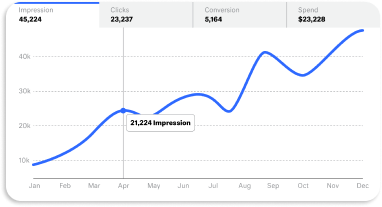In a collaborative effort between Quora For Business and Intel, Apurva Jani – Marketing Director, Intel India, an experienced Sales, Marketing, and Strategy Leader, provides valuable insights into new-age marketing in an exclusive conversation with Neha Chimbulkar – Head of Marketing – APAC and MEA, Quora.
The interview discusses intent marketing, consumer behaviour, the role of social media, the impact of partnerships with Quora, emerging trends, and more.
The following has been edited for brevity and clarity.
In the realm of marketing and business, the pursuit of “finding buyers who are ready to buy” is paramount. Could you share your insights and strategic approach to harnessing intent marketing to its fullest potential?
Intent marketing is what I refer to as the hyper focused marketing wherein businesses and marketers tend to focus on customers who provide appropriate signals, indicating their willingness to buy something. Basically, there is an urgency factor as well as a need to kind of immediately go in for the products and solutions they are looking for.
Given the pressure on revenues and the need to deliver business goals it’s no surprise that high intent marketing has grown in terms of popularity more so, with the digital tools, marketers are opting for high intent marketing increasingly.
In my opinion, intent marketing is an effective approach that provides a notable return on investment and helps us focus on active buyers who are looking to make purchases in near future. Therefore, if used proficiently, it can be a great addition to a marketing mix.
What notable shifts in spending patterns and consumer behavior have you observed among your target audience? How have these observations shaped your marketing strategies?
The biggest shift which all of us experienced, which I classify as a seismic shift, happened because of the pandemic. Since, it gripped our lives for almost two years it changed our habits significantly. It changed the way we live, shop and more importantly the outlook that we have towards our lives. Notably, the pandemic has accelerated the growth of e-commerce considerably. But according to me it has also given rise to what is popularly known as armchair consumerism.
Prior to the pandemic we were living in an age of experience, where we loved to go out and spend time shopping and comparing options. But nowadays I see consumers spending more time online which is giving rise to this kind of a consumerism wherein everything is available at the click of a button. Moreover, today we also have social media providing us with product reviews and influencers telling us about how they have adapted to a particular brand or a product.
The other trend which is quite predominant is the rise of omnichannel. This reflects the consumer’s desire to receive the best of everything, they want the convenience of digital channels combined with the experience of touch and feel that the offline channels offer. In fact, few businesses have already established their own buy online, pick up offline up stores. So, the rise of omnichannel is something that I see as sustaining and co-existing as we go forward.
Another interesting trend which although is not something entirely new, but still noteworthy, is the emergence of the wellness industry. Prior to 2019 the focus was around health and fitness but a subtle shift can be observed in terms of the focus on wellness. Wellness being more of an all encompassing term which includes health and fitness but along with an emphasis on mental well being. Various offerings have come up in this area as well, like headspace, an app trying to tap into the holistic healing arena.
Not only this, consumers today strive to be more balanced with regard to their consumption patterns and sustainability is priorotized more than ever.
In recent times, platforms like Quora (specifically for business) have gained significant traction among marketers due to their ability to attract high-intent audiences. What are your thoughts on brands capitalizing on these new-age platforms? How can they effectively leverage the unique opportunities they provide?
Today there is a sense of community or belongingness to everything that a consumer does. For instance, the rise of bikers or gamers as a community where consumers are bound by common interests and passions. Platforms like Quora can prove to be immensely beneficial for the emergence and sustenance of such communities or bonds that consumers share.
The rationale being, firstly, they kind of enhance the sense of community or belongingness to a specific platform. Secondly, such platforms offer users an opportunity to interact, discover more about their interests and explore their favourite brand’s products and offerings within the community in a question and answer format. So, this is certainly a trend which I would watch for as a marketer.
Digital marketing has become a favoured element in the media mix for today’s marketers. How do you view the role of social media marketing in this landscape? What strategies can brands employ to maximise their return on investment (ROI) through social media channels?
Social media is quite a vital part of the marketing mix used by brands. Once there is clarity or agreement regarding a marketing opportunity or challenge that a brand needs to address, the role of social media becomes more apparent. With its diverse audiences, profiles, and demographics, social media offers a range of possibilities depending on the business objectives. As a result, it finds its place as a valuable platform and tactic within the marketing mix of an organization.
The point is that by its very nature social media is a very versatile platform and my advice to marketers would be to not think of social media as the sole strategy but to see where it fits within the marketing mix as per the business and the marketing objectives.
In what ways can brands establish a thought leadership position on Quora, allowing them to communicate their objectives in a more integrated and personalised manner? How can they effectively engage with the platform’s audience on a one-on-one level?
There are two potential ways in which we can leverage platforms such as Quora. One is mining the platforms for what our audiences want to know and understand about the categories and businesses that we operate on. This gives us an insight into the kind of questions they have and the information they are seeking.
The second part of it is that platforms such as Quora offer us an opportunity to drive thought leadership. More importantly these conversations are not one-way conversations but two-way which makes the entire process way more interactive. All in all our experiences have been positive as we continue to explore platforms like Quora to drive data backed and intent backed marketing approaches.
Related Content

Playbook
Social Media Marketing

Industry Insights

Industry Insights
Book a consultation with a Quora expert
![]()



